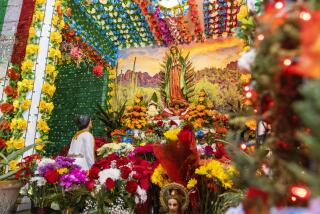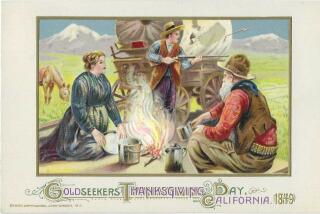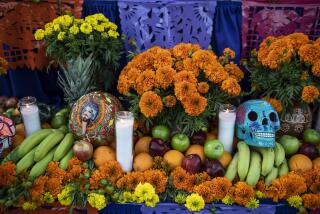Toss a Fish on the Grill--It’s Thanksgiving!
- Share via
Forget turkey, cranberry sauce and pumpkin pie. Thanksgiving dinner today at MaryAnn Zabala Moore’s house in Hacienda Heights will probably consist of fish and maybe a little roast duck.
Moore is among thousands of Southern Californians whose European-colonist ancestors sat down 398 years ago to what some historians describe as the first American thanksgiving dinner--one that occurred a full 23 years before the Pilgrims cooked up their own legendary harvest feast.
The settlers were natives of Spain, Portugal, Belgium, Greece and the Canary Islands who were headed for what is now New Mexico. They were being led by Juan de Onate, and they had survived four months of tortuous travel through the Mexican desert before reaching the Rio Grande near what is now El Paso.
The trek was chronicled by conquistador Gaspar Villagra, who wrote in an account published in Spain in 1610 that the 400 settlers suffered greatly before reaching the river. Herding about 7,000 horses, cattle and sheep along with them, the colonists resorted to eating roots and berries as they crossed the Mexican badlands.
Ten days after crossing the river--on April 30, 1598--Onate instructed the colonists to dress in their best clothes and prepare a feast of gratitude. The menu: fish from the Rio Grande and local waterfowl.
But the colonists’ legacy largely disappeared behind that of the Pilgrims and their harvest-time Thanksgiving. Until now, that is.
For the past eight years history buffs in El Paso have recreated Onate’s thanksgiving feast. This year’s event--featuring costumed conquistadors and settlers--drew a crowd of 4,000 on Sunday.
In Los Angeles, the memory of the colonists’ arrival is being revived by local members of the Genealogical Society of Hispanic America. Southern California members of the nonprofit research group work out of the Santa Fe Springs library.
Many of them were surprised to find their ancestors were among the first Europeans to settle North America.
“Sometimes we don’t get a full picture of history from school,” said Moore, a 53-year-old retired legal secretary who heads the society’s 150-member Los Angeles branch.
Pauline Chavez Bent agrees. She is a 68-year-old Huntington Beach resident who helped form the society and has traced her own family roots back to 1567.
“When we went to school and had the Thanksgiving program, it was always about the Pilgrims coming on the Mayflower to the East Coast. When you find out your ancestors preceded the Pilgrims by 23 years, that’s pretty neat,” Bent said Monday.
(Onate’s expedition was not the first European settlement in America. That occurred 13 years earlier on Roanoke Island, where British settlers established a colony in 1585 that lasted less than a year. A second attempt in 1587 also failed.)
Bent is planning fish tacos for dinner tonight--using Alaskan salmon caught by her husband, Jerry. But she will continue to enjoy turkey on the other Thanksgiving in November.
Historians say there is plenty of room in U.S. culture for both. And they say history is starting to catch up with people like Onate, a Spaniard who was hired by the king of Spain to lead the New Mexico colonizing effort.
Most history taught until recently has been shaped by historians living in the 18th and 19th centuries in the northeast United States, said John Allswang, a Cal State L.A. history professor.
“It was easy to ignore the Southwest when it didn’t become part of the U.S. until the late 19th century. Historians didn’t consider it part of American history.”
Despite the popularity of the Pilgrims’ Thanksgiving, Americans seem to have an open mind about the conquistadors’ day of thanks, too, according to Texas author and historian Leon Metz.
“Everybody takes it good-naturedly,” said Metz, who is based in El Paso. “It’s not that the history was hidden. It’s just that not many had bothered to read the written record.”
Sheldon Hall, a retired El Paso building contractor who helped launch his city’s annual Onate thanksgiving commemoration ceremony in 1989, said Monday that El Paso residents are already planning a 400th anniversary event two years from now.
It will be a reunion of Americans whose ancestors were there the first time. Thankfully, he said, travel will be easier next time around.
More to Read
Sign up for The Wild
We’ll help you find the best places to hike, bike and run, as well as the perfect silent spots for meditation and yoga.
You may occasionally receive promotional content from the Los Angeles Times.







